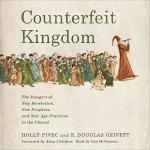Same-sex marriage is now the law of the land. It became so in 2015 when the Supreme Court so ruled in Obergefell v. Hodges, and now that judicial action has been written into statutory law with the House and the Senate passing, with significant support from Republicans, the “Respect for Marriage Act.”
That law provides protections for religious dissenters, though some observers say those protections are very weak. The debate about whether or not conservatives should get behind the legislation as “the best deal we can get” or reject it entirely is now over. The bill passed. It will take time and many lawsuits to find out exactly what its impact will be on religious liberty. But in the meantime, Christians with Biblical convictions about sex and marriage need to figure out where to go from here.
Some are saying that we should just split off Christian marriage from civil marriage. The state can define marriage any way it wants, while the church can be faithful to its own conviction and only marry men and women. I have heard some pastors say that they should just conduct weddings without even worrying about requiring the couple to get a marriage license from the government.
That would seem to solve the problem for both sides. The state could operate without religious considerations and the church could operate without legal considerations. Men could marry men and women could marry women at the courthouse. Or, if they wanted a religious wedding, they could find a mainline liberal Protestant congregation that would be happy to accommodate them. Conservative churches could not be compelled to perform the wedding–the text of Respect for Marriage Act includes that safeguard–so everyone should be happy. Right? Well, it is more complicated than that.
Jake Meador of Mere Orthodoxy has written a thoughtful, balanced, but ultimately orthodox discussion of the issue entitled Tolkien Was Right: Notes on the Respect for Marriage Act and the Post-Boomer Church. He notes that C. S. Lewis in his book Christian Behavior, later incorporated into Mere Christianity, proposes something similar in how the church might deal with the marriage issue of his day, the liberalization of divorce laws.
Lewis suggested having two tracks for marriage: church marriages, following the Christian view of marriage, would be for life, while civil marriages, following the current cultural norms, would be more permissive. Lewis’s friend J. R. R. Tolkien, the author of Lord of the Rings, vehemently disagreed.
An editor going through Tolkien’s papers after his death found in his copy of Christian Behavior a letter that he had written to his friend Lewis but never mailed. I’ll let Meador tell about it:
Tolkien objected strongly to the idea and wrote an aggressive letter to his friend saying so. “No item of Christian morality,” Tolkien said, “is valid only for Christians.”
In other words, Christian morality is human morality because Christianity is a true account of reality, including the human person. You can’t create bifurcations between a kind of privatized religious morality and the real public morality that governs our common life together. Tolkien continued,
The foundation is that (Christian morality) is the correct way of “running the human machine.” Your argument reduces it merely to a way of (perhaps?) getting extra mileage out of a few selected machines.
The horror of the Christians with whom you disagree (the great majority of all practicing Christians) at legal divorce is in the ultimate analysis precisely that: horror at seeing good machines ruined by misuse…. Toleration of divorce — if a Christian does tolerate it — is toleration of a human abuse, which it requires special local and temporary circumstances to justify (as does the toleration of usury) — if indeed either divorce or genuine usury should be tolerated at all, as a matter of expedient policy.
To be sure, sins and crimes are separate things. There are any number of sins that oughtn’t be made illegal and punishable by the government. But Tolkien here is not arguing for sectarianism or theocracy.
He is merely insisting that we flirt with disaster when we presuppose that the moral law and our nation’s civil laws have (basically) nothing to do with one another. If you can change civil laws in ways that make them explicitly contrary to God’s moral law, Tolkien thinks, you’re headed for trouble.
Later, Meador quotes Tolkien again on how
Elsewhere in his letter to Lewis, he said that the disorders and abuses brought about by more permissive divorce laws would never be limited to more permissive divorce laws:
Wrong behavior (if it is really wrong on universal principles) is progressive, always: it never stops at being “not very good,” “second best” – it either reforms, or goes on to third-rate, bad, abominable.
Of course, an ignorance about the most basic human community in creation —the family — will inevitably manifest as more general confusion about human community writ large. And so here we are.
Indeed, we have gone from controversy over divorce to controversy over same-sex marriage. Today, the church–even conservative churches, except for Catholics–have pretty much come to accept the state’s easy-going divorce laws. Do you think churches will eventually do the same with same-sex marriage?
A two-track marriage system is especially problematic for us Lutherans and other Protestants who deny that marriage is a sacrament. Strictly speaking, as the Reformers insisted, marriage has to do with God’s Temporal Kingdom. Yes, in marriage God joins together a man and a woman (Matthew 19:3-12), but he does so by working through the civil authorities. Marriage is not a sacrament, but a vocation. It is not just for Christians, but for everyone. That doesn’t prevent marriage from being an image of Christ and the church (Ephesians 5: 22-33), and it is certainly appropriate for marriages to be blessed by the church and for pastors to preside at weddings. But a courthouse wedding is just as valid.
I would add that even though marriage falls under the purview of civil authority, that doesn’t mean civil magistrates can define marriage any way they please. Those whom God does not join together cannot be joined together by the state.
So where does that leave us? Help me out here.
It seems to me that Christians who get married should still follow civil law, getting a marriage license where that is legally required, and pastors should still do whatever paperwork they need to do in order to say, “By the authority invested in me by the state of [whatever], I now pronounce you husband and wife.”
Right now, the law, however it distorts marriage, does not prevent Christian marriage. The law allows divorce for any reason, but Christians, for the most part, should not avail themselves of that option. Christians with same-sex attraction should strive for celibacy and not get married to someone of their same sex, even though the law allows them to do so.
As for the controversy between Tolkien and Lewis, I think that Tolkien is right and that Lewis made an uncharacteristic mistake. But the church may not have a choice in the matter. Meador was writing when Christian were debating whether or not to support the Respect for Marriage Act, and I don’t think they should have. But now that it has been passed–and if the religious liberty issues turn out to be as onerous as come critics predict–something like a two-track system may be forced upon us, whether we agree with that or not.
And in other ways, Christian marriages may well come to look more and more different from the secular versions, in which many opposite-sex couples are emulating same-sex couples, for whom sex has nothing to do with conceiving children, to the point of not having children at all.
HT: Steve Bauer
Illustration: “Groom and Groom” by j4p4n via Openclipart, Public Domain












